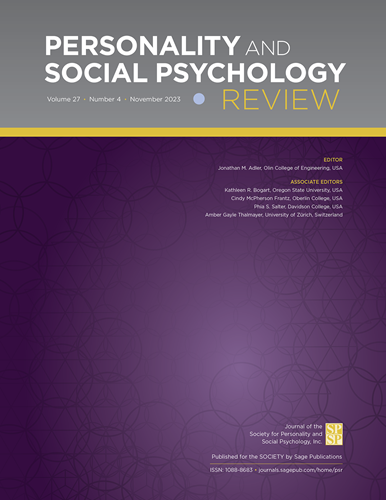工作场所性别平等的非殖民化干预:交叉和拉丁美洲的镜头。
IF 10.4
1区 心理学
Q1 PSYCHOLOGY, SOCIAL
引用次数: 0
摘要
虽然性别平等被认为是一个全球目标,但现有的进步参数和干预措施主要与西方背景和学术传统保持一致,而这些背景和传统往往忽视了多数世界的复杂现实。本文对这些方法的主导地位提出了批评,并强调了普遍应用这些方法所面临的挑战。我们研究了主流性别平等学术研究的局限性,包括缺乏多样性,特别是交叉性,方法偏差和个人层面的解决方案如何在不经意间使不平等永久化。我们提出了基于拉丁美洲理论和实践的替代方案,以设计促进性别平等的非殖民化和交叉干预措施。最后,我们呼吁通过引入5S框架进行系统性变革,该框架倡导以下干预措施:(a)挑战现状,(b)关注系统性变革,(c)对社会背景敏感,(d)可持续,(e)有证据支持。摘要性别平等是一个全球性的问题,但许多策略和解决方案往往忽视了世界各地不同文化和社会背景下的人们所面临的独特挑战。本文探讨了为什么这些一刀切的方法不起作用,并强调需要更具包容性和协作性的解决方案。我们考察了核心局限性,如缺乏对性别与种族、阶级和其他因素的交叉关注,以及将变革的责任放在个人身上而不是解决更大的社会和系统问题的倾向。为了应对这些挑战,我们提出了5S框架,该框架强调干预措施:挑战现状,关注系统性变化,对社会背景敏感,可持续,并有证据支持。我们不提供固定的答案,而是鼓励合作和对文化敏感的努力,以创造更公平、更有效的方式促进全球性别平等。本文章由计算机程序翻译,如有差异,请以英文原文为准。
Decolonizing Interventions for Workplace Gender Equity: An Intersectional and Latin American Lens.
Academic AbstractAlthough gender equity is acknowledged as a global objective, existing progress parameters and interventions predominantly align with Western contexts and academic traditions, which often overlook the complex realities of the Majority World. This paper provides a critique of the dominance of such approaches and highlights the challenges of applying them universally. We examine the limitations of prevailing gender equity scholarship, including how a lack of diversity in general and intersectionality in particular, methodological biases, and individual-level solutions may inadvertently perpetuate inequities. We propose alternatives based on Latin American theory and practice to design decolonial and intersectional interventions for gender equity. Finally, we call for a systemic change by introducing the 5S framework, which advocates for interventions that (a) challenge the status quo, (b) focus on systemic changes, (c) are sensitive to social context, (d) are sustainable, and (e) are supported by evidence.Public AbstractGender equity is a global priority, but many strategies and solutions often ignore the unique challenges faced by people in different cultural and social contexts around the world. This paper explores why these one-size-fits-all approaches do not work and highlights the need for more inclusive, collaborative solutions. We examine core limitations such as the lack of focus on how gender intersects with race, class, and other factors, and the tendency to place the responsibility for change on individuals rather than addressing larger social and systemic problems. To tackle these challenges, we propose the 5S framework, which emphasizes interventions that: challenge the status quo, focus on systemic changes, are sensitive to social context, are sustainable, and are supported by evidence. Instead of offering fixed answers, we encourage collaborative and culturally sensitive efforts to create fairer and more effective ways to promote gender equity worldwide.
求助全文
通过发布文献求助,成功后即可免费获取论文全文。
去求助
来源期刊

Personality and Social Psychology Review
PSYCHOLOGY, SOCIAL-
CiteScore
19.00
自引率
1.90%
发文量
20
期刊介绍:
Title: Personality and Social Psychology Review (PSPR)
Journal Overview:
Official journal of SPSP, the Society for Personality and Social Psychology, Inc.
Premiere outlet for original theoretical papers and conceptual review articles in all areas of personality and social psychology
Features stimulating conceptual pieces identifying new research directions and comprehensive review papers providing integrative frameworks for existing theory and research programs
Topics Covered:
Attitudes and Social Cognition: Examines the inner workings of the human mind in understanding, evaluating, and responding to the social environment
Interpersonal and Group Processes: Explores patterns of interaction and interdependence characterizing everyday human functioning
Intergroup Relations: Investigates determinants of prejudice, conflict, cooperation, and harmonious relationships between social groups
Personality and Individual Differences: Focuses on causes, assessment, structures, and processes giving rise to human variation
Biological and Cultural Influences: Studies the biological and cultural mediation of social psychological and personality processes
 求助内容:
求助内容: 应助结果提醒方式:
应助结果提醒方式:


